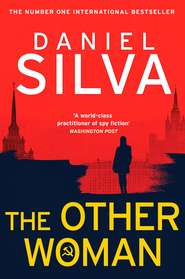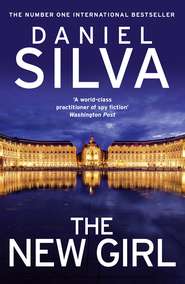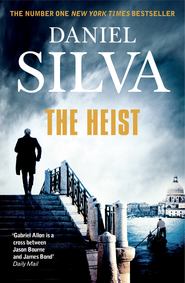По всем вопросам обращайтесь на: info@litportal.ru
(©) 2003-2024.
✖
The Black Widow
Настройки чтения
Размер шрифта
Высота строк
Поля
Gabriel handed him another photograph.
“The woman from the Paris attack?”
Gabriel nodded. Then he instructed Fareed to look carefully at the man seated alone in the corner of the café, with an open laptop computer.
“Jalal?”
“In the flesh.”
“Any chance it’s a coincidence?”
Gabriel handed the Jordanian two more photos: Safia Bourihane and Jalal Nasser on the rue de Rivoli, Safia Bourihane and Jalal Nasser on the Champs-Élysées.
“I guess not.”
“There’s more.”
Gabriel gave Fareed two more photos: Jalal Nasser with Margreet Janssen at a restaurant in Amsterdam, Jalal Nasser holding his recently slapped cheek on a street in the red-light district.
“Shit,” said Fareed softly.
“The Office concurs.”
Fareed returned the photos. “Who else knows about this?”
“Paul Rousseau.”
“Alpha Group?”
Gabriel nodded.
“They’re quite good.”
“You’ve worked with them?”
“On occasion.” Fareed shrugged. “As a rule, France’s problems come from other parts of the Arab world.”
“Not anymore.” Gabriel returned the photos to his briefcase.
“I assume you have Jalal under watch.”
“As of last night.”
“Have you had a chance to peek at that laptop?”
“Not yet. You?”
“We drained it the last time we brought him in for a chat. It was clean as a whistle. But that doesn’t mean anything. Jalal is very good with computers. They’re all very good. And getting better by the day.”
Fareed started to light one of his English cigarettes but stopped. It seemed that Gabriel’s aversion to tobacco was well known to the GID.
“I don’t suppose you’ve mentioned any of this to the Americans.”
“Who?”
“What about the British?”
“In passing.”
“There’s no such thing when it comes to the British. Furthermore,” said Fareed with his newsreader formality, “I know for a fact they’re terrified that they’re going to be hit next.”
“They should be terrified.”
Fareed ignited his gold lighter and touched his cigarette to the slender flame. “So what was Jalal’s connection to Paris and Amsterdam?”
“I’m not sure yet. He might be just a recruiter or talent spotter. Or he might be the project manager.” Gabriel was silent for a moment. “Or maybe,” he said finally, “he’s the one they call Saladin.”
Fareed Barakat looked up sharply.
“Obviously,” said Gabriel, “you’ve heard the name.”
“Yes,” conceded Fareed, “I’ve heard it.”
“Is he?”
“Not a chance.”
“Does he exist?”
“Saladin?” Fareed nodded slowly. “Yes, he exists.”
“Who is he?”
“He’s our worst nightmare. Other than that,” said Fareed, “I haven’t a clue.”
15 (#ulink_45a92ee5-b2cd-54d1-a125-91139c19d43f)
GID HEADQUARTERS, AMMAN (#ulink_45a92ee5-b2cd-54d1-a125-91139c19d43f)
OF THE TERRORIST’S NAMESAKE, HOWEVER, the GID chief knew a great deal. Salah ad-Din Yusuf ibn Ayyub, or Saladin, was born into a prominent family of Kurds, in the town of Tikrit, in approximately 1138. His father was a soldier of fortune. Young Saladin lived for a time in Baalbek, in present-day Lebanon, and in Damascus, where he drank wine, pursued women, and played polo by candlelight. Damascus was the city he preferred over all others. Later, he would describe Egypt, the financial hub of his empire, as a whore who tried to separate him from his faithful wife Damascus.
His realm stretched from Yemen to Tunisia and north to Syria. It was ruled over by a hodgepodge of princes, emirs, and greedy relatives, all held together by Saladin’s diplomatic skills and considerable charisma. He used violence to great effect, but found it distasteful. To his favorite son, Zahir, he once remarked: “I warn you against shedding blood, indulging in it and making a habit of it, for blood never sleeps.”
He was lame and sickly, watched over constantly by a team of twenty-one doctors, including the philosopher and Talmudic scholar Maimonides, who was appointed his court physician in Cairo. Lacking in personal vanity—in Jerusalem he once laughed uproariously when a courtier splashed his silk robes with mud—he had little interest in personal riches or earthly delights. He was happiest when surrounded by poets and men of learning, but mainly it was the concept of jihad, or holy war, that consumed him. He built mosques and Islamic centers of learning across his lands and lavished money and favors on preachers and religious scholars. His goal was to re-create the zeal that had allowed Islam’s earliest followers to conquer half of the known world. And once the sacred rage had been rekindled, he focused it on the one prize that had eluded him: Jerusalem.
A smallish outpost fed by springs, the city occupied a strategic high ground at the crossroads of three continents, a geographical sin for which it would be punished throughout the ages. Besieged, plundered, captured and recaptured, Jerusalem had been ruled by Jebusites, Egyptians, Assyrians, Babylonians, Persians, Greeks, Romans, Byzantines, and, of course, the Jews. When Omar al-Khattab, a close confidant of Muhammad, conquered Jerusalem in 639 with a small band of Arab cameleers from the Hejaz and Yemen, it was a predominantly Christian city. Four and a half centuries later, Pope Urban II would dispatch an expeditionary force numbering several thousand European Christians to reclaim Jerusalem from the Muslims, whom he regarded as a people “alien to God.” The Christian soldiers, who would one day be known as Crusaders, breached the city’s defenses on the night of July 13, 1099, and slaughtered its inhabitants, including three thousand men, women, and children who had taken shelter inside the great al-Aqsa Mosque on the Temple Mount.
It was Saladin, the son of a Kurdish soldier of fortune from Tikrit, who would return the favor. After humiliating the thirst-crazed Crusader force at the Battle of Hattin near Tiberias—Saladin personally sliced off the arm of Raynald of Châtillon—the Muslims reclaimed Jerusalem after a negotiated surrender. Saladin tore down the large cross that had been erected atop the Dome of the Rock, scrubbed its courts with Damascene rosewater to remove the last foul traces of the infidel, and sold thousands of Christians into slavery or the harem. Jerusalem would remain under Islamic control until 1917, when the British seized it from the Ottoman Turks. And when the Ottoman Empire collapsed in 1924, so, too, did the last Muslim caliphate.











